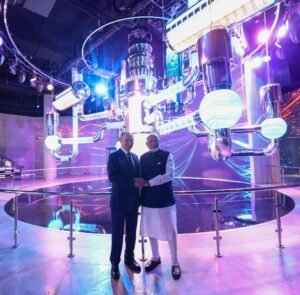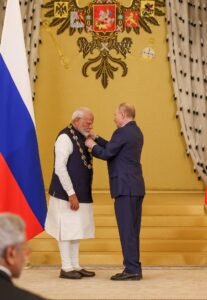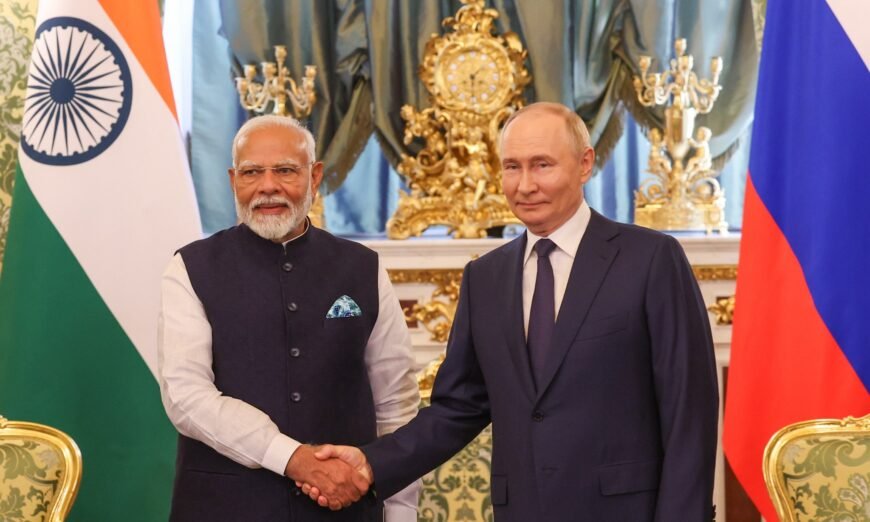India-Russia: Enduring and Expanding Partnership

Prime Minister of the Republic of India Shri Narendra Modi paid an official visit to the Russian Federation on July 8-9, 2024 at the invitation of President of the Russian Federation H.E. Mr. Vladimir Putin for the 22nd India – Russia Annual Summit.
During the visit, H.E. Mr. President Vladimir Putin conferred Russia’s highest civilian honour the “Order of Saint Andrew the Apostle” on Prime Minister Shri Narendra Modi for his distinguished contribution to the development of Special and Privileged Strategic Partnership between India and Russia and friendly ties between the peoples of the two countries.

Political relations
The Leaders noted the continued strengthening and deepening of the Special and Privileged Strategic Partnership between India and Russia.
The Leaders highly appreciated the special nature of this time-tested relationship which is based on trust, mutual understanding and strategic convergence. Regular bilateral engagement at all levels, including during India’s Chairship of SCO and G20 in 2023 and under Russia’s Chairship of BRICS in 2024, helped in further deepening and expansion of the growing bilateral partnership.
The Leaders positively assessed the multi-faceted mutually beneficial India-Russia relations that span all possible areas of cooperation including political and strategic, military and security, trade and investment, energy, science and technology, nuclear, space, cultural, education and humanitarian cooperation. It was noted with satisfaction that both Sides are actively exploring new avenues for cooperation while further strengthening cooperation in the traditional areas.
The Sides underlined that India-Russia ties have remained resilient in the backdrop of the prevailing complex, challenging and uncertain geopolitical situation. Both Sides have strived to forge a contemporary, balanced, mutually beneficial, sustainable and long-term partnership. Development of the India-Russia relations over the entire spectrum of cooperation areas is a shared foreign policy priority. The Leaders agreed to make all efforts to unlock the full potential of the strategic partnership.
Cooperation at the level of Foreign Ministries
The Leaders appreciated the close cooperation between the Foreign Ministries and frequent meetings and exchanges between the Foreign Ministers for nurturing and steering the bilateral partnership through the constantly evolving and complex geopolitical scenario and adapting it to the changing circumstances. The regular close engagement has also helped in a deeper understanding and appreciation of each other’s core interests, positions on international issues and in various international and multilateral organizations.
The Leaders welcomed the Protocol on Foreign Office Consultations for the period 2024-28 signed in December 2023 between the Ministry of External Affairs of India and the Ministry of Foreign Affairs of the Russian Federation which lays down the foundation for exchanges and dialogue on most pressing bilateral, global and regional issues. They noted with satisfaction the regular holding of Foreign Office Consultations on bilateral, UN related, Counter-Terrorism, Consular and Property matters as well as regional and global issues of mutual interest.
Parliamentary Cooperation
The Sides noted the close inter-parliamentary interaction and underlined the importance of regular meetings of Inter-Parliamentary Commission and Parliamentary Friendship Groups of both Houses as a valuable component of India-Russia relations. They appreciated the visit of the Speaker of the Russian Federation Council to New Delhi in October 2023 for the 9th G20 Parliamentary Speakers’ Summit.
Cooperation between National Security Councils
The Leaders highlighted the importance of the security dialogue at the level of National Security Advisors and the National Security Councils on bilateral and regional issues and welcomed regular interactions which facilitated greater strategic understanding and coordination between the two countries on bilateral as well as global and regional issues of mutual concern.
Trade and Economic partnership
The Sides noted with satisfaction the significant growth of bilateral trade in 2023 which is around double of the bilateral trade target of USD 30 billion set by the Leaders for 2025. To achieve balanced and sustainable bilateral trade in long term, the Leaders stressed the need to increase Indian exports to Russia through strengthening industrial cooperation, forging new technological and investment partnerships, especially in advanced high-technology areas and finding new avenues and forms of cooperation.
Aiming to further accelerate and sustain the growth in bilateral trade, the Leaders agreed to set the bilateral trade target of USD 100 billion by 2030.
The Leaders welcomed the 24th Session of the India-Russia Intergovernmental Commission on Trade, Economic, Scientific, Technical and Cultural Cooperation (IRIGC-TEC) and India-Russia Business Forum held in New Delhi in April 2023, and the inaugural meetings of the Working-Groups and Sub-Working Groups on Transport, Urban Development and Railways. They appreciated the work of the Commission for ensuring further expansion and diversification of bilateral economic relations. They agreed to hold the next session of IRIGC-TEC in the second half of 2024 in Russia.
The Leaders, seeking to provide an additional impetus to the deepening of the trade and economic cooperation and guided by the intention to maintain the trend of dynamic growth in trade of goods and services between the two states and the desire to ensure a significant increase in its volume, instructed the concerned agencies to prepare a Programme for the development of promising areas of Russian-Indian economic cooperation till 2030 (Programme-2030). The Sides reaffirmed readiness to contribute to the implementation of the initiatives, projects, measures and activities provided for by the Programme-2030. The overall coordination of its implementation will carried out by the IRIGC-TEC. Its Working Groups and Sub-Working groups, as well as concerned agencies of the two countries are instructed to ensure monitoring, control and support of the Programme-2030.
Transport and Connectivity
The Sides share approaches on building a new architecture of stable and efficient transport corridors, and pay close attention to the development of promising production and marketing chains in Eurasia, including for the purpose of implementing the idea of a Greater Eurasian space. In this context, the Sides expressed readiness to actively work to expand logistics links with an emphasis on increasing the capacity of infrastructure, including for implementation of the Chennai-Vladivostok (Eastern Maritime) Corridor and the International North-South Transport Corridor, as well as using the potential of the Northern Sea Route.
Both Sides will continue joint efforts to intensify the use of INSTC route in order to reduce the time and cost of cargo transportation and to promote connectivity in the Eurasian space. Cooperation in the field of transport and logistics will be based on the principles of transparency, broad participation, local priorities, financial sustainability and respect for sovereignty and territorial integrity of all nations.
Energy partnership
The Sides reiterated the importance of the robust and wide ranging cooperation in the energy sector as a significant pillar of the Special and Privileged Strategic Partnership. In this context, the Sides noted the continued special importance of bilateral trade in energy resources and agreed to explore new long term contracts.
The Sides appreciated the ongoing cooperation in the coal sector and agreed to explore the possibility for further increasing supply of coking coal to India, and the opportunities of exporting anthracite coal from Russia to India.
Cooperation in the Russian Far East and Arctic
The Sides their readiness to intensify trade and investment cooperation in the Far East and the Arctic zone of the Russian Federation. In this regard, the Sides welcomed the signing of the Program of India-Russia cooperation in trade, economic and investment spheres in the Russian Far East for the period from 2024 -2029, as well as of cooperation principles in the Arctic zone of the Russian Federation. The Program of Cooperation will provide the necessary framework for further cooperation between India and the Russian Far East region, especially in the sectors of agriculture, energy, mining, manpower, diamonds, pharmaceuticals, maritime transport, etc.
Civil Nuclear Cooperation, Cooperation in Space
The Sides noted the importance of the cooperation in the peaceful uses of nuclear energy as a significant component of the strategic partnership. The Sides welcomed the progress achieved in the construction of the remaining nuclear power plant units at Kudankulam and agreed on adhering to the schedule, including to the timelines for delivery of supplies. Both Sides noted the importance of further discussion on the second site in India in accordance with earlier signed agreements. The Sides agreed to continue technical discussions on the VVER 1200 of the Russian design, localization of equipment and joint manufacturing of NPP components as well as on cooperation in third countries. The Sides confirmed their intention to broaden cooperation in Nuclear Power including fuel cycle, life cycle support for operating KKNPPs and non-power applications.
Noting the importance of cooperation in Space, the Sides welcomed the enhanced partnership between the Indian Space Research Organization and the Russian State Space Corporation “Roscosmos” in the use of outer space for peaceful purposes, including in the human spaceflight programs, satellite navigation and planetary exploration. The Russian Side congratulated India on successful landing of Chandrayaan-3 as a long stride in the exploration of outer space and the impressive progress made by India in science and engineering, which can be mutually beneficial for future cooperation. The Sides agreed to explore prospects of mutually beneficial cooperation in rocket engine development, production and use.
Military and Military Technical Cooperation
Military and Military-Technical Cooperation has traditionally been the pillar of Special and Privileged Strategic Partnership between India and Russia, which has grown from strength to strength through several decades of joint efforts and fruitful cooperation, steered by the Intergovernmental Commission on Military and Military Technical Cooperation (IRIGC-M&MTC).The Sides expressed their satisfaction with regular defence and military contacts, including the meeting of Defence Ministers in New Delhi in April 2023 on the sidelines of the SCO Defence Ministers’ Meeting and joint exercises of the Armed Forces of the two countries. They agreed to hold the 21st round of IRIGC-M&MTC in Moscow in the second half of 2024. Responding to India’s quest for self-sufficiency, the partnership is reorienting presently to joint research and development, co-development and joint production of advanced defence technology and systems. The Sides confirmed commitment to maintain the momentum of joint military cooperation activities and expand military delegation exchanges.
Cooperation in Education and Science & Technology
The Sides noted the importance of bilateral cooperation in science, technology and innovation, confirmed mutual interest in developing partnerships between educational and scientific organizations, including the implementation of various academic mobility forms, educational programs and research projects, as well as cooperation in the opening of branches of interested Russian educational and scientific organizations in India.
Recognizing the traditionally strong cooperation between India and Russia in the sphere of education, the Sides agreed to continue their efforts in promoting linkages between universities and educational institutions and in this regard welcomed the Education Summit organised in India with participation of about 60 Russian universities in April 2024.
Cultural cooperation, Tourism and people to people exchanges
The Sides agreed that cultural interaction is an important component of the Russia-India Special and Privileged Strategic Partnership. The Sides support and encourage the establishment of direct contacts and further cooperation between ensembles, theaters, libraries, museums, creative universities and other cultural institutions of the two countries.
Underlining the traditionally robust cultural linkages, the Sides appreciated the successful implementation of Cultural Exchange Programme between the Ministry of Culture of the Russian Federation and the Ministry of Culture of the Government of the Republic of India for 2021-2024, which plays a crucial role in enhancing people to people contacts. It was agreed to continue the mutually beneficial practice of reciprocally holding cultural and film festivals. The need for geographical expansion of cultural exchanges and greater involvement of the youth and folk art groups was also highlighted. In this regard, the Sides noted with satisfaction, the successful holding of Festival of Indian Culture in eight cities of Russia in September 2023, and the Festival of Russian Culture in India in 2024.
Noting the important role of youth in promoting the bilateral relations the Leaders noted with satisfaction the enhanced youth exchanges through the active participation of Indian delegation of students and young entrepreneurs in the Sochi World Youth Festival in March 2024 and Indian sportspersons and athletes in the “Games of the Future” and BRICS Games in Kazan in March and June 2024 respectively.
Cooperation in the UN and multilateral fora
The Sides stressed the importance of strengthening their strategic partnership and close coordination within BRICS, and welcomed the decision to expand the membership of BRICS that was taken at the XV summit in Johannesburg. They reaffirmed their commitment to the BRICS spirit featuring mutual respect and understanding, equality, solidarity, openness, inclusiveness, and consensus. Russia and India agreed to continue joint efforts aimed at ensuring continuity and consolidation of BRICS cooperation, seamless integration of new members in BRICS, and developing modalities for establishing a BRICS Partner Country Model. The Russian Side expressed gratitude to India for supporting the priorities of the Russia’s Chairship in 2024.
The Sides welcomed the new member States to the expanded BRICS family. India expressed its full support to Russia’s BRICS Chairship in 2024 under the theme “Strengthening Multilateralism for Just Global Development and Security”. The Sides expressed their commitment to working together for the success of the XVI BRICS Summit in October 2024 in Kazan.
Counter terrorism
The Leaders unequivocally condemned terrorism and violent extremism conducive to terrorism in all its forms and manifestations including the cross-border movement of terrorists, and terrorism financing networks and safe havens. They strongly condemned the recent dastardly terrorist attack on an Army convoy in Kathua area of Jammu & Kashmir on 8th July 2024, in Dagestan on 23rd June and on the Crocus City Hall in Moscow on 22nd March and stressed that these terrorist attacks are a grim reminder for further strengthening cooperation to combat terrorism. The Sides called for an uncompromising fight against international terrorism and extremism in all their forms and manifestations, noting the importance of increasing cooperation in this area, without hidden agendas and double standards on the solid basis of international law and the UN Charter. Besides, they stressed the need for firm implementation of relevant resolutions of the UN Security Council, the UN General Assembly, as well as the implementation of the UN Global Counter-Terrorism Strategy.
The Sides agreed to continue interaction within G20, BRICS, SCO on key issues such as increasing the sustainability and developing resiliency of international supply chains, compliance with free and fair trade rules and climate change. They welcomed the launch of the BRICS Contact Group on Climate Change and Sustainable Development within the framework of the Environment Working Group under the Russian Chairship in BRICS in 2024.
The Sides noted with satisfaction the resilience of India-Russia Special and Privileged Strategic Partnership and the convergent and complementary approaches of their foreign policy priorities, and reaffirmed their commitment for its further strengthening. They stressed that India and Russia as major powers will continue to strive for global peace and stability in a multipolar world.
Prime Minister Shri Narendra Modi thanked President H.E. Mr. Vladimir Putin for the gracious hospitality extended to him and his delegation in Moscow and invited him to visit India in 2025 for the 23rd India-Russia Annual Summit.

